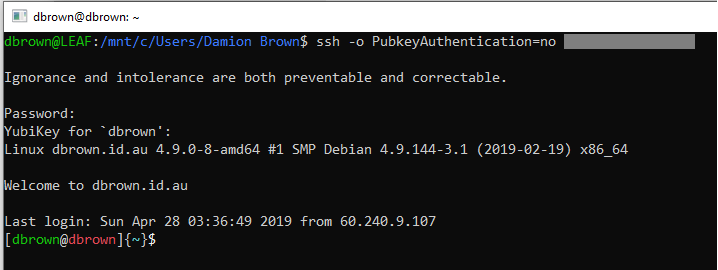- Sun 28 April 2019
- Tech
YubiKey's and Yubico OTP
A YubiKey is comparable to a Trusted Platform Module, but wrapper up in a secure crush-resistant USB interface package.
Yubico One-Time Password (OTP) is a function of the Yubikey whereby a 128-bit (44-char) blob is produced via keyboard emulation.
Via the Pluggable Authentication Module (PAM) yubico-pam we can require an OTP as a Multi-Factor Authentication (MFA) scheme.
Installation
First, install the yubico PAM module - I advise using the system package manager.
sudo apt-get update
sudo apt-get install libpam-yubico
Head over to yubico.com/getapikey/ and generate yourself a Client ID.
Modify /etc/pam.d/sshd with the following line:
auth sufficient pam_yubico.so id=[Your API Client ID] debug
Check the pam_yubico.so file is located in /lib/security/ (or wherever PAM modules live in your system).
Now some technical trivia:
By default the OpenSSH daemon is configured to use the 'password' authentication scheme (defined in RFC-4252 § 8)
To use the yubico-pam module, we need to switch to the 'keyboard-interactive' authentication scheme (defined in RFC-4256)
Modify your /etc/ssh/sshd_config and:
- set
PasswordAuthenticationtono - set
ChallengeResponseAuthenticationtoyes
Without making this change, the yubico-pam module is unable to prompt the client to enter an OTP.
Authorization Mapping Files
The mapping file authorizes YubiKey(s) to provide OTP codes for authentication.
It is stored in a user's home directory under ~/.yubico/authorized_yubikeys and must contain a user name and a YubiKey token ID separated by colons.
The file must have only one line and should look like this:
<user name>:<YubiKey token ID1>:<YubiKey token ID2>
Obtaining the YubiKey token ID (a.k.a. public ID)
A YubiKey token ID is included as part of each 128-bit OTP blob, specifically the first 12 characters.
- Open a terminal
- Press the YubiKey's button, It will output an OTP into the shell:
$ cccccccgklgcvnkcvnnegrnhgrjkhlkfhdkclfncvlgj
bash: cccccccgklgcvnkcvnnegrnhgrjkhlkfhdkclfncvlgj: command not found
The user's YubiKey token ID would be cccccccgklgc
Debug
If you're running into issues, add the debug directive to the end of your /etc/pam.d/ configuration line for the yubico-pam module.
Then create a world-writeable log file
touch /var/run/pam-debug.log
chmod go+w /var/run/pam-debug.log
Extra
More documentation about yubico-pam and configurable directives
- See this github page
Modifying /etc/ssh/sshd_config will only require an OTP code for SSH authentication
- If you modified instead
/etc/pam.d/sudoor/etc/pam.d/common-password, then OTP codes would be required for those authentication methods.
The Yubico server ensures that OTP codes cannot be used in a replay attack
- If you don't want to rely on an external service, or you have an offline system or network - you can host your own validation server.
For a more detailed explination about PasswordAuthentication and ChallengeResponseAuthentication
If you are using Public Key Infastructure (PKI) with SSH
- Note that PAM modules are not used as PKI is performed within the OpenSSH daemon itself. I think this is doable but I havn't looked into it.
To disable SSH private key usage on a client
ssh -o PubkeyAuthentication=no example.com
For more information on PAM auth control flags
Can I use yubico-pam with google-authenticator-libpam?
- Yes, you should set your PAM configuration like so:
auth [success=1 default=ignore] pam_yubico.so id=[Your API Client ID]
auth required pam_google_authenticator.so no_increment_hotp
- The
[success=1 default=ignore]means that on success, the next1line will be skipped. Any other result will cause the module's results to be ignored.
For more information on advanced PAM auth control flags

